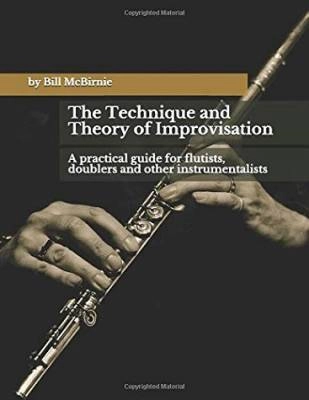Extreme Flute The Technique and Theory of Improvisation - McBirnie - Flute - Book

Great Additions
Description
- Composer/Author: MCBIRNIE, BILL
- Instrumentation: FLUTE
- Model # 9781999227302
Author: Bill McBirnie
Format: Book
Instrumentation: Flute
This is a concise but comprehensive guide to (1) the technique (articulation, vibrato, and breathing) and (2) the theory (rhythm, melody and harmony) that are essential in learning to improvise.The book also addresses how to integrate the technique with the theory using a simple melodic approach, based on small bits that you can develop into bigger bits. In addition, the book examines practical issues such as analysing tunes, using an idiomatic approach, and transcribing, with plenty of examples and illustrations. As SIR JAMES GALWAY points out in the foreword, this is a useful and valuable source of reference for the aspiring student and the experienced performer or teacher.
Bill McBirnie is an internationally recognised jazz and Latin flute player. In 2006, Sir James Galway solicited Bill, personally, to serve as his resident Jazz Flute Specialist. Bill is the only triple-crown winner in all three of the National Flute Association's jazz flute (1) Soloist, (2) Masterclass, and (3) Big Band competitions. Bill is also a designated "Haynes Artist" with the venerable Wm. S. Haynes, Co.
Q & A
Reviews
Perfect book for the Woodwind Doubler
1 of 1 customers found this review helpful
Reader Reaction
3 of 3 customers found this review helpful
by Bill McBirnie
Responses from the Critics
GARTH THOMAS (The Hollywood Digest): “McBirnie discusses potentially complex musical ideas with a laser focus on disentangling them in a way that is easy for the reader to follow. This is most helpful when McBirnie delves into difficult topics like theory where he also provides musicians and students with a useful philosophical underpinning they may not have had before reading this text. McBirnie deservers much praise for his ability to reduce important [topics] in a manner that never sounds pretentious or high-handed. The effect is ultimately one of sharing private instruction time with him, and this feeling of intimacy makes the book’s content all the more impactful.”
CLAY BURTON (Independent Music and Arts): “The reach of this book goes far beyond McBirnie’s chosen instrument. Every novice musician can read it, and glean important guidance, and share the obvious passion McBirnie has for his art. The text often reads as if it is alight with joy. He cuts intimidating propositions down to a manageable size by including a variety chord charts, lists, and snippets of sheet music throughout the text, including lots of listening suggestions. These never overshadow his writing, and they balance the exposition adding immeasurable value to the book. It is genuinely impressive how much knowledge McBirnie packs into such a limited length. McBirnie has written a brief but enduring work that ranks as one of the best contributions to music literature published in recent memory, and his résumé backs him up every step of the way. This is a book suited to endure indefinitely and gain even more lustre over time.”
JASON HILLENBURG (Good Reads): “McBirnie’s book formulates a musically sound approach to improvisation in clear and concise terms that musicians at any level can use.”
Responses from the Readers
BACKBEAT: I was delighted to read Mr. McBirnie's new reference on the Art and Science of making music by improvisation. While it would be particularly helpful to those who play flute, he manages to make the theory "generic" enough that it applies to all instrumentalists.
Of particular value is his unique approach to the subject. Too many references on jazz theory get into extensive, overly detailed analyses of all kinds of scales to play over various chord configurations, and my experience has been that this tends to result in an overly cold, clinical style of playing with very little "heart" or soul in its melodic content.
Instead, Mr. McBirnie actually manages to simplify the analysis of chords and scale types so as not to confuse the novice improviser with unnecessary minutiae or detail, choosing instead to emphasize the joy of making melody that talks directly to the listener and makes an emotional connection. This is the stock in trade of the blues musician, or the Latin/Cuban musician, and it works; whereas too many novice jazz musicians get caught up in the cerebral, academic side of their craft and wind up making a musical product that can be emotionally cold.
This is a very readable book, full of good suggestions to inspire the improvising musician to explore the art of music rather than the mathematics of it.
Thank you, Mr. McBirnie, for sharing your very human approach to music!
STUART LAUGHTON: I’ve been looking/hoping for a sort of Grand Unifying Theory, not of the universe or of physics, but as an approach to improvisation. Once obtained, I would apply this theory to the instruments I’m learning (flute and sax) as well as trumpet. In my imagination, it would not matter which instrument I had in my hand.
I believe your book will supply that Grand Theory, because you have simplified things in a way I’ve not seen before. So, now the fun begins! A thousand thank you’s.
MIKE LEISENBACH: This book is dense with knowledge gleaned from Bill's many years of jazz playing. I've been playing quite a while myself, so I was aware of some of the facts contained, but Bill offered explanations that made many things clearer as well as giving me new concepts to incorporate into my playing.
For anyone who cares to, this book will give you many hours of practicing joy. I've already gotten things that I am able to apply right now, and items that will take some time to assimilate. It's the best improv book I have - and I have several.
PATRICK BOYLE: Any success I have on flute is due to your excellent book. I think your book is just great. The breathing section has really helped me. Organizationally, you’ve effectively laid out a big part of your life’s work, clearly and cogently.
It’s straightforward enough for a jazz newbie and comprehensive enough for medium to advanced players as a expert reference guide. Moreover, I think it has the power to refresh and recharge teachers and players alike. I am really honoured you shared it with me. My thanks is long overdue.
MARK HELMAN: Bill has released his new book and I know it’s worth a look for every musician. It’s what I expected. Well written, well thought out, and every page is full of useful and practical information.
JONATHAN ROYCE-GERRY: Got your book, a veritable treasure trove of great pointers, reminders, and fresh perspective on the subject. Great job! Also a really refreshing change from the hundreds (thousands?) of books out there filled with pages and pages of modes and scales and licks, etc.
Your book distills the infrastructure of jazz improvisation as you see it, suggesting ways to actually *use* the language. Again, great job!
MIKE SEGAL: Precise, concise, with an underlying spirit of wisdom steeped in the affair we call life. Well done, Bill, and congrats. Thanks again.
ARMEN MATOSYAN: Two of the best jazz theory books (in my opinion) are Mark Levine’s The Jazz Theory and Bill McBirnie’s The Technique and Theory of Improvisation. While the first one is encyclopedic for drilling down on details, Bill McBirnie managed to get the same amount of information in just over 150 pages, easy to consume, and right to the point.
Practical, with numerous tips and tricks, I consider this book the cream of the crop and table reference book for every jazz improviser.
KEITH RIDENHOUR: It’s a great introduction to your philosophy of teaching. Great resource. Excited to work out the exercises. Much to learn. Bill, you have a thoughtful method.
ROB NEAL CHRISTIAN: I was working through this exercise book yesterday. It reminded me of our lessons together. You have really distilled the essence of your playing philosophy in this book! It is a useful resource to have, and a helpful reminder of so many of your important teachings.
JOHN GARDNER: A great new guide by Bill McBirnie. Check it out, flute friends! Thanks for writing this book!
GLEN HALL: Got your book two weeks ago. What a gem, Bill!
ART LEVINE: I got a copy of your book and found it really interesting. Even the technique sections which are supposedly “flute specific” reveal an underlying musicality that will speak to anyone, not just flutists or wind players.
But the main thing for me was the theory section. Even though I don't have a clue about improvisation, I could still readily see the intelligence and insight that went into this.
TOM KOCH: This is a clearly written and easy to read—a good typeface—introduction to jazz by one of North America’s premier jazz flautists. It offers both a range of practical suggestions and exercises, in sections that offer even beginners a window on not only playing but understanding jazz.
The section on theory is dense sometimes, but then, in understanding the structure of modern jazz, Bill's intuitive approach of the early jazzers has been enfolded into a broad musical understanding. Even for those not attuned to theory, there is much here that helps the nascent jazzer, and those interested in jazz (and especially the flute) to learn.
Obviously, I liked it.
MARK ALBAN LOTZ: The Dutch Flute magazine 'FLUIT' asked me to review Bill McBirnie's new book, 'The Technique And Theory Of Improvisation'. I never review the work of my dear colleagues. But in this particular case, I quickly surrendered.
The book is a gem! I learned a lot from it, and I totally endorse it. My review is now published, and I hope it will generate the orders the book deserves. 'The Technique And Theory Of Improvisation' is a must have. Bam!
BRIAN HINKLE: I've been working with your book for the past couple of months. What a treasure! I am learning so much. Thank you for your amazing work!
JAKE KOFFMAN: A wonderful book it is indeed. Loving it!
MARTIN BENTLEY: I have just started your book. It is concisely and excellently written. I agree with [BACKBEAT's] review. Thank you.
KEN HADLEY: I was really thrilled to buy a copy of your book, having heard you play...I think your book is by far the most sensible guide to the art and science of improvisation that I've ever read, and your "obligato approach" makes perfect sense. One of these days, when I have a chance to head into Toronto, I intend to study with you; but obtaining your excellent book was a great step in that direction. Thank you for your efforts, both in playing brilliantly, and in writing with heart and intelligence.
PAUL CHENEOUR: Wonderful, and a must-have book, no matter what level of playing you have reached.
AMAZON CUSTOMER: Well written and based on decades of experience. This book is incredibly easy to read considering it is a comprehensive framework for Musical Improvisation (both Technique and Theory). It also includes most of the key considerations from a stylistic perspective. It's incredibly dense, and clearly written.





